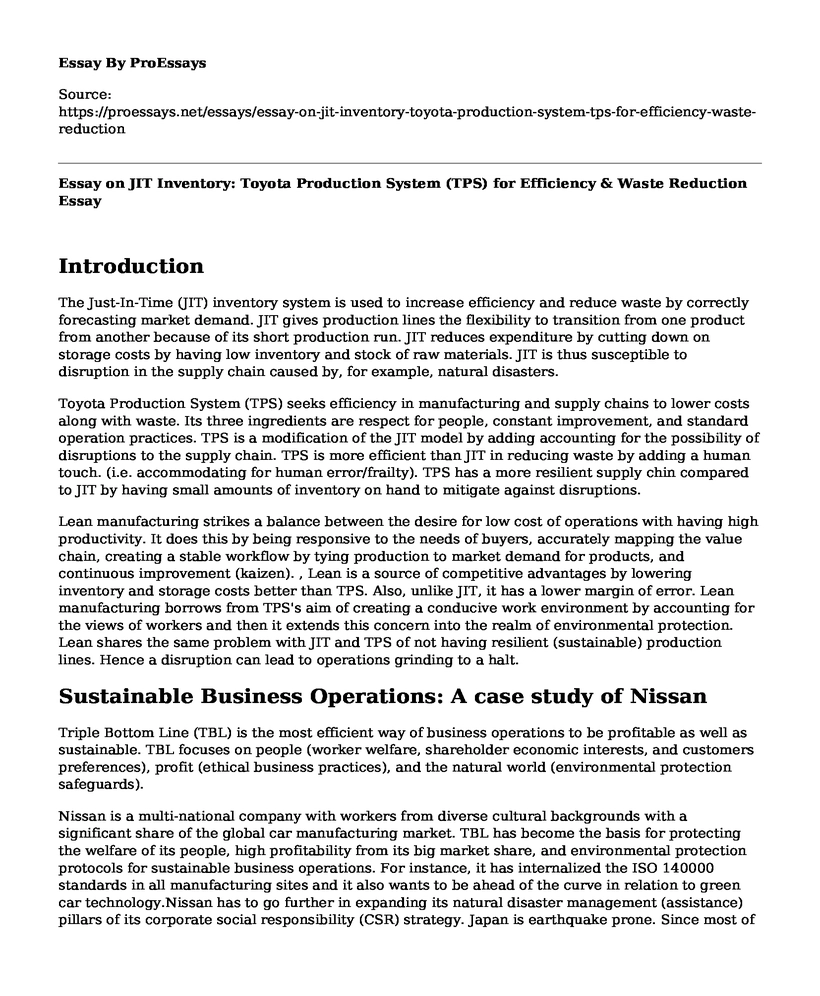Introduction
The Just-In-Time (JIT) inventory system is used to increase efficiency and reduce waste by correctly forecasting market demand. JIT gives production lines the flexibility to transition from one product from another because of its short production run. JIT reduces expenditure by cutting down on storage costs by having low inventory and stock of raw materials. JIT is thus susceptible to disruption in the supply chain caused by, for example, natural disasters.
Toyota Production System (TPS) seeks efficiency in manufacturing and supply chains to lower costs along with waste. Its three ingredients are respect for people, constant improvement, and standard operation practices. TPS is a modification of the JIT model by adding accounting for the possibility of disruptions to the supply chain. TPS is more efficient than JIT in reducing waste by adding a human touch. (i.e. accommodating for human error/frailty). TPS has a more resilient supply chin compared to JIT by having small amounts of inventory on hand to mitigate against disruptions.
Lean manufacturing strikes a balance between the desire for low cost of operations with having high productivity. It does this by being responsive to the needs of buyers, accurately mapping the value chain, creating a stable workflow by tying production to market demand for products, and continuous improvement (kaizen). , Lean is a source of competitive advantages by lowering inventory and storage costs better than TPS. Also, unlike JIT, it has a lower margin of error. Lean manufacturing borrows from TPS's aim of creating a conducive work environment by accounting for the views of workers and then it extends this concern into the realm of environmental protection. Lean shares the same problem with JIT and TPS of not having resilient (sustainable) production lines. Hence a disruption can lead to operations grinding to a halt.
Sustainable Business Operations: A case study of Nissan
Triple Bottom Line (TBL) is the most efficient way of business operations to be profitable as well as sustainable. TBL focuses on people (worker welfare, shareholder economic interests, and customers preferences), profit (ethical business practices), and the natural world (environmental protection safeguards).
Nissan is a multi-national company with workers from diverse cultural backgrounds with a significant share of the global car manufacturing market. TBL has become the basis for protecting the welfare of its people, high profitability from its big market share, and environmental protection protocols for sustainable business operations. For instance, it has internalized the ISO 140000 standards in all manufacturing sites and it also wants to be ahead of the curve in relation to green car technology.Nissan has to go further in expanding its natural disaster management (assistance) pillars of its corporate social responsibility (CSR) strategy. Japan is earthquake prone. Since most of its production line is in Japan, members of its workforce and their families are directly affected by these violent seismic events (Schmidt, and Simchi-Levi,2013). Its public image is already very positive because it has used CSR to show that it prioritizes the lives of its workers over the product they produce , but it could go further by building strong working relationship with the natural disaster assistance programs available to members of the general public in Japan or elsewhere who are not their employees.
References
Schmidt, W., & Simchi-Levi, D. (2013). Nissan Motor Company Ltd.: Building Operational Resiliency. MIT Sloan management review, 13-149. https://www.calltutors.com/data/assignments/requirements/18759/13-149%20Nissan.Simchi-Levi.pdf
Cite this page
Essay on JIT Inventory: Toyota Production System (TPS) for Efficiency & Waste Reduction. (2023, May 03). Retrieved from https://proessays.net/essays/essay-on-jit-inventory-toyota-production-system-tps-for-efficiency-waste-reduction
If you are the original author of this essay and no longer wish to have it published on the ProEssays website, please click below to request its removal:
- Essay Sample on British Petroleum Oil Spills
- Paper Example on Business Level Strategies of Apple
- International Business and Walmart Paper Example
- Essay Sample on Academic History
- Critical Infra Protect: Essential for Govt's Success - Essay Sample
- My Data Request on Amazon: An Easy and Secure Experience - Essay Sample
- Microsoft: Diverse Businesses, Multibillion-Dollar Impact - Essay Sample







